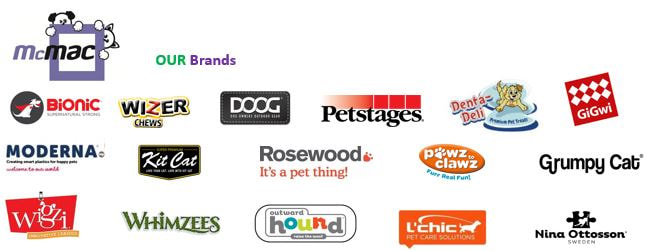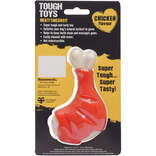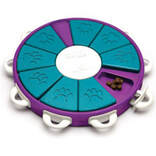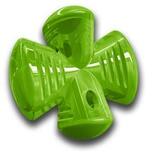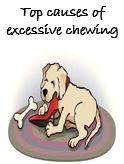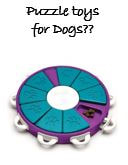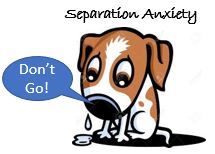Dog is Chewing Everything ......Ask a Trainer
By Nan Arthur, CDBC, CPDT, KPA CTP - www.wholedogtraining.com
(a really great website to browse through)
By Nan Arthur, CDBC, CPDT, KPA CTP - www.wholedogtraining.com
(a really great website to browse through)
(Note from FOTD - if the dog is only engaging in the destructive chewing when the owner is out, possibility is that separation anxiety may be present. Contact a behaviour consultant for help with this. www.animal-behaviour.org.za)
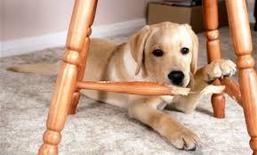
ear Trainer, I’m ready to get rid of my dog (not really, but I’m not happy). She is a chewing fanatic and has ruined several remote controls, my husband’s glasses, the legs of several pieces of furniture, and lots of other things around the house. It’s getting expensive to replace some of those things and she seems to be getting worse the last couple of weeks. We have given her several rawhides, but she doesn’t seem to be that interested in those. How can we make her stop chewing? Also, my dog is a cattle dog mix and is just over a year old now. Signed, All Chewed Up
Dear Chewed, I’m sorry to hear about your dog’s oral fixation problem, but it is a common one that is often seen in dogs that are known to have higher energy, and a cattle dog certainly fits that bill. It has also been raining a lot in the last couple of weeks and many dogs in our area are feeling a little “cabin fever” by not getting out and exercising and playing as they normally would, so that might contribute to your dog’s increase in her chewing activities.
Why dogs chew
Chewing relieves stress, provides mental and physical exercise and satisfies some underlying drives. Many dogs have much stronger needs to chew and if they are not provided with the “right” things to chew on, they will find things that suit their needs, as you have seen with your dog.
Considering that your dog is chewing things that are hard, and contain heavy human scents (glasses and remotes) says something about your dog and her need to chew. First, when dogs choose things with heavy human scent, they might be looking for comfort due to anxiety or stress. This type of chewing often takes place when people are gone. This can indicate a dog’s anxiety about being alone. This would not necessarily qualify as separation anxiety at its most severe level, but it does match some of the symptoms.
The type of things that dogs choose to gnaw on is also a clue to solving the puzzle of ending the problem. Since your dog is choosing things that have a hard texture, it would be a natural assumption that providing her with things of a like nature will help keep her teeth off of your furniture and such.
What to do
Prevention is one of the first things to consider with your dog’s chewing problems. When you are not able to supervise your dog, she shouldn’t have access to the things that you don’t want her to chew. You can achieve this by limiting her access via crates, dog runs, a laundry room, exercise pens or baby gates. Be sure to practice confining your dog before leaving her for long periods of time, and make any of these areas comfortable and cozy. You can add something with your scent to make it more pleasant for your dog as well.
Consider using a taste deterrent that you spray on things to make them taste bad. There are many types of these and you may have to try a couple of them to find one that your dog doesn’t like.
Providing your dog with things to chew that will satisfy the hardness and texture of the things she normally chews will help her relieve the need to munch, and hopefully help her to direct that need to more appropriate items.
The following are things that you might consider:
If your dog seems uninterested in things like pressed rawhides or Nyabones, make them better! You can do this by pressing things like cream cheese into the tiny cracks and crevasses of pressed rawhides, or try dipping them in beef broth. You can also drill a couple of holes (make them big enough so your dog’s teeth won’t get stuck in them) in a Nyabone so you can add fun treats or gooey stuff in the holes to entice your dog to chew these.
If you are not familiar with my thoughts and feelings about diet, please visit my website’s article section and read about how diet can affect behavior. In a nutshell, help your dog be calmer by feeding low or no-grain foods with no corn, wheat or soy products.
Dear Chewed, I’m sorry to hear about your dog’s oral fixation problem, but it is a common one that is often seen in dogs that are known to have higher energy, and a cattle dog certainly fits that bill. It has also been raining a lot in the last couple of weeks and many dogs in our area are feeling a little “cabin fever” by not getting out and exercising and playing as they normally would, so that might contribute to your dog’s increase in her chewing activities.
Why dogs chew
Chewing relieves stress, provides mental and physical exercise and satisfies some underlying drives. Many dogs have much stronger needs to chew and if they are not provided with the “right” things to chew on, they will find things that suit their needs, as you have seen with your dog.
Considering that your dog is chewing things that are hard, and contain heavy human scents (glasses and remotes) says something about your dog and her need to chew. First, when dogs choose things with heavy human scent, they might be looking for comfort due to anxiety or stress. This type of chewing often takes place when people are gone. This can indicate a dog’s anxiety about being alone. This would not necessarily qualify as separation anxiety at its most severe level, but it does match some of the symptoms.
The type of things that dogs choose to gnaw on is also a clue to solving the puzzle of ending the problem. Since your dog is choosing things that have a hard texture, it would be a natural assumption that providing her with things of a like nature will help keep her teeth off of your furniture and such.
What to do
Prevention is one of the first things to consider with your dog’s chewing problems. When you are not able to supervise your dog, she shouldn’t have access to the things that you don’t want her to chew. You can achieve this by limiting her access via crates, dog runs, a laundry room, exercise pens or baby gates. Be sure to practice confining your dog before leaving her for long periods of time, and make any of these areas comfortable and cozy. You can add something with your scent to make it more pleasant for your dog as well.
Consider using a taste deterrent that you spray on things to make them taste bad. There are many types of these and you may have to try a couple of them to find one that your dog doesn’t like.
Providing your dog with things to chew that will satisfy the hardness and texture of the things she normally chews will help her relieve the need to munch, and hopefully help her to direct that need to more appropriate items.
The following are things that you might consider:
- Pressed rawhides—much harder than the white ones, and get really big ones so she has to work harder at them.
- Raw bones—knuckle, soup or marrow bones all provide a hard surface, and because of the meat and marrow, will keep your dog munching for hours. Be mindful to dispose of these or limit where your dog can chew on them to prevent possible disease to humans.
- Stuffed Kongs TM that are frozen after you are done adding the different layers of food. See the Kong TM website for recipes and more ideas on how to stuff them and what to put in them.
- Bully sticks are often a favorite of many dogs, and these come in many sizes and shapes. Nyabones are another extra hard surface that many dogs like to chew. Check out the different sizes and styles on there website: http://www.nylabone.com/
If your dog seems uninterested in things like pressed rawhides or Nyabones, make them better! You can do this by pressing things like cream cheese into the tiny cracks and crevasses of pressed rawhides, or try dipping them in beef broth. You can also drill a couple of holes (make them big enough so your dog’s teeth won’t get stuck in them) in a Nyabone so you can add fun treats or gooey stuff in the holes to entice your dog to chew these.
If you are not familiar with my thoughts and feelings about diet, please visit my website’s article section and read about how diet can affect behavior. In a nutshell, help your dog be calmer by feeding low or no-grain foods with no corn, wheat or soy products.
Some of our favourite toys for mental stimulation and chewing. Click on pic for details where to obtain.
Mental exercise
Finally, in addition to the physical exercise you give your dog (be careful not to over do this or you might have a more stressed dog from over arousal), be sure to give your dog plenty of things that will exercise her brain.
Training is one very fun way to expend the need for mental exercise and have a better behaved dog in the process. Take a class or teach on your own, but do be sure to use only positive methods so you teach your dog what you want.
Games, such as hide and seek for food is another great way to increase mental exercise. Hide some high-value treats around the house or in the yard and encourage your dog to find them. Finally, for an easy mental game, throw your dog’s wh
Finally, in addition to the physical exercise you give your dog (be careful not to over do this or you might have a more stressed dog from over arousal), be sure to give your dog plenty of things that will exercise her brain.
Training is one very fun way to expend the need for mental exercise and have a better behaved dog in the process. Take a class or teach on your own, but do be sure to use only positive methods so you teach your dog what you want.
Games, such as hide and seek for food is another great way to increase mental exercise. Hide some high-value treats around the house or in the yard and encourage your dog to find them. Finally, for an easy mental game, throw your dog’s wh

..
|
Behaviour in a dog never happens in a vacuum - there is always a reason, whether excessive chewing or another behaviour problem. Find out the main causes of excessive chewing.
|
Not only do puzzle toys provide valuable mental stimulation and build the bond with owners, they can also help when there are any behaviour issues present.
|
Separation anxiety is a terrible things for dogs to have, and unfortunately not only will it get worse if not attended too, other behaviours, such as storm fear and fear of noises etc can develop.
|

